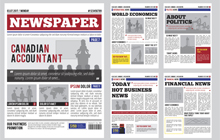Sunday News Roundup 22.05.08: CRA court allegations, NS squid jigging, landlords and more

Wrapping up the odds and ends from the past week in Canadian accounting news
Subscribe to our weekly newsletter and get all the week’s stories. Click here to sign up.
TORONTO, May 8, 2022 – Allegations of workplace dysfunction at the Canada Revenue Agency reached the floor of the House of Commons this past week. As noted in last week’s Canadian Accountant, “something strange is going on” at the CRA. This past Monday, both the CBC and the Globe and Mail reported that a case before the Federal Court, which was originally reported on as a case of workplace dysfunction, has its roots in allegations of wrongdoing at the global tax division.
While the details are fascinating, here is a brief outline: Employees at the CRA were unhappy with a “sweetheart deal” given to a Canadian multinational in 2019. They felt pressured by management to accept a resolution and complained of workplace problems. When the Public Sector Integrity Minister chose not to investigate the deal, CRA employees filed a suit in Federal Court.
There are a few aspects of the case worth noting. The first and most obvious is that, according to a CRA report, the former head of the division told a CRA investigator that her “division was corrupt.”
Another aspect is the nature of the deal in question. While court documents redact the name of the multinational company involved, the company operated in the United States, Netherlands and Ireland. The latter two countries are known tax havens for multinationals. The United States also has low tax jurisdictons (Delaware, South Dakota) that are favourites of corporations and trusts.
Finally, the CBC names “lawyer Scott Wilkie” as the tax representative for the multinational firm. Canadian accountants know Mr. Wilkie a renowned transfer pricing expert who currently teaches tax at Osgoode Hall Law School. He has practised tax law at more than one high-profile Bay Street law firm, has been a registered federal government lobbyist, and is a prolific writer on international tax policy. If there is such a thing as a “transfer pricing celebrity,” Mr. Wilkie would qualify as a star. He did not respond to CBC’s request for comment.
No word yet on where this case is going in Federal Court. And now, on to the rest of the odds and ends from the past week in Canadian accounting.
Inflation, supply chain issues worry business leaders
The latest issue of the CPA Canada Business Monitor (Q1 2022) came out this past week. Inflation and supply chain concerns are the top two challenges to the growth of the Canadian economy cited by business leaders. Respondents report that their organizations are recruiting and retaining employees by using tactics like increasing compensation (68 per cent), hybrid working arrangements (50 per cent) and improving work-life balance options (50 per cent as well).
But business leaders’ optimism about their own businesses has softened since the Q4 2021 Business Monitor, dropping from 69 to 64 per cent. Only 10 per cent report feeling pessimistic but 27 per cent are on the fence.
On an interesting note, respondents are also looking for government action to reduce the impacts of climate change. More than half (57 per cent) of the business leaders surveyed agreed that the federal government should focus on mitigating climate change, versus 24 per cent who disagreed and 19 per cent who took no position.
Smedmor: Ford budget fudges the numbers
Forensic accountant Charles Smedmor always writes interesting articles that are based on cold, hard numbers. In Six problems with the Ford government’s election budget, Smedmor notes how the Ford government lowballed interest rates and its reserve fund in its pre-election budget, pointing out the inaccuracies that he sees as a forensic accountant.
Nova Scotia reverses course, scraps Come-From-Away Tax
And finally, the headline says it all: Nova Scotia Premier Tim Houston has done some fancy squid jigging and, according to the Globe and Mail, “dropped his plan to hike taxes on properties owned by non-residents, saying he was concerned about the damage it would cause to the province’s reputation as a place to visit, live and invest.”
The Come-From-Away Tax was the top story a few weeks ago in one of our Sunday News Roundups. It was a ridiculously populist idea and we will miss the opportunity to go fishing for more Maritime humour.
Quick Hits
Canada’s largest landlords have saved billions through tax exemptions, according to a new analysis. Is Ottawa about to end the party? (Toronto Star)
Tax & Spend: Why is Ontario slashing the growth of its health-care spending? (Globe and Mail)
Higher interest rates may mean taking some time to rethink (Globe and Mail)
By Canadian Accountant staff.








(0) Comments